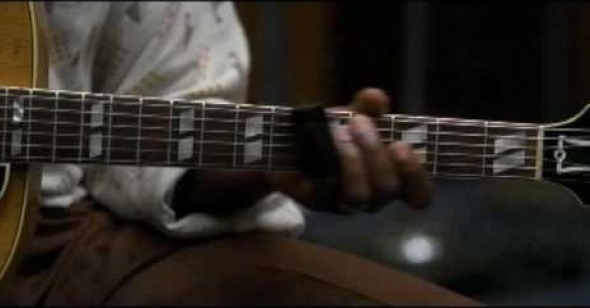For the Records
by Justin Stewart
Who Do You Love
Dir. Jerry Zaks, U.S., International Film Circuit
Midway through Who Do You Love, Muddy Waters and his band are in a rural pool hall having a loud good time, when harmonica player Little Walter brushes against a white man in billiard shot stance. Violence erupts, epithets fly, and murder seems imminent until officers arrive (absurdly quickly) and break it up. Will the white cop blame it all on the black musicians? On the contrary, when they tell him they're in town for a concert, he asks, “Where's this show?” A fine, even welcome twist on racist hick “justice,” and one of several weighted commentaries one must allow a movie depicting such a racially complex story as that of the early days of Chicago's Chess Records. But it's not enough for writers Peter Martin Wortmann and Robert Conte, and director Jerry Zaks, who insist on more healing. At Jackson Hall, the offending white ruffian himself shows up to make amends and reveal a secret—he plays harmonica, too! He wants to show his stuff to Walter, but since he forgot to bring his harp, he borrows Walter's, covered in poignant negro spittle. The man blows out a respectable solo after only a second's hesitation.
Only five minutes of screen time, but this sort of well-meaning, lullaby whitewashing infects all of Who Do You Love, and it's a more serious misstep than its main faults, namely the pervasive middlebrow mediocrity and redundancy. For the story was dramatized only two years ago, in Darnell Martin's Cadillac Records, an excitingly acted and vigorous (if photographically bland) movie that fans of Muddy Waters, Little Walter, and formative electric blues and rock—not to mention Beyoncé Knowles—saw and received well in large numbers. It's no doubt a case of Capote/Infamous bad timing for Zaks's film, but . . . tough break. He does add some scorching Bo Diddley performances that Cadillac lacked, but the redux, more hamhanded with each plot turn than Martin's version, suffers by the comparison. A tough marketeer like Lenny Chess would probably laugh at this misfortune of fate.
While Cadillac Records conflated the Czyz brothers, Poles who Americanized their last name once in the States, into one Adrian Brody, Who Do You Love has both Leonard (Alessandro Nivola) and Phil (Jon Abrahams). It's fair to give Phil his due, though he's mostly a beefy non-presence, there to provide bursts of laughter when Lenny cracks wise, or make disapproving faces when he neglects his wife and kid. From their Chicago salvage yard roots, the movie jogs quickly through the budding blues lovers' opening of the important Macomba lounge, which becomes an oasis in a slum. Meeting bassist/songwriter/producer Willie Dixon (Chi McBride), who will become a right-hand man, Lenny learns the charm of saying “motherfucker,” which Nivola repeats endlessly throughout the movie, a particularly unfunny and annoying refrain.
Lenny is restless. Money's tight at home, and the nagging of his wife (Marika Dominczyk) is getting louder. Fishing with his son, Lenny is talking about favorite records when his son asks, “Do you make records?” Here, Nivola stares off into the watery distance, having a revelation of his destiny. Earlier, he'd gotten the same twinkle when he saw cash being exchanged at a club's bar, and decided to open Macomba. One day, a fresh-off-the-bus McKinley Morganfield (David Oyelowo) shuffles into a lobby where Lenny, Willie, and Jimmy Rogers (Keb' Mo') are sitting, and his introduction ends with the mildly painful-because-inevitable “but my friends call me Muddy.” It's a mythic moment, but so easy. The thrill it gives blues fans is the empty excitement of seeing the motions of a history one cares about perfunctorily gone through.
Nivola, so memorable as Pollox Troy in Face/Off and as a naive yuppie in Junebug, is appealingly brawny, and better than his dialogue, like when his wife asks why he's so devoted to the music (“It makes me feel!”). Oyelowo is a vivacious Waters as he moves from shyness to earned arrogance, though it's hard to top Jeffrey Wright's novel interpretation in Cadillac Records. Etta James, played by Beyonce before, is here turned into composite character Ivy Mills. Marika Dominczyk is damn sexy and sings beautifully, but the screenplay's Ivy serves exclusively as a walking symbol of Leonard's cautious indulgence in the “exotic,” and James's drug use is crassly exploited to provide tragic melodrama. McBride, an exhausting ham, sustains Who Do You Love's snappy-phony period tone. With one line, his Dixon dismisses Leonard's duplicitous cash-skimming: “I don't mind that you don't be sharin' profits like you should.”
Further exploring this dark side of the story's relationships would have been beyond the movie's pay grade. Zaks, helmer of several Everybody Loves Raymond episodes and better known for his work in theater, just wants to tell a story, and his language is corny humor, flashbulb montages, and exasperated heads collapsing onto recording studio soundboards. In short, the vocabulary of cliché.
